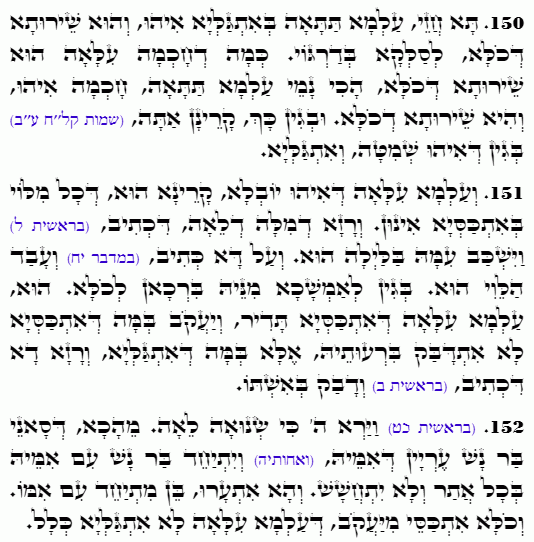Daily Zohar # 4721 – Vayetze – Therefore a man shall leave his father and mother…
Daily Zohar 4721

Hebrew translation:
151. וְהָעוֹלָם הָעֶלְיוֹן, שֶׁהוּא הַיּוֹבֵל, קוֹרְאִים הוּא, שֶׁכָּל דְּבָרָיו הֵם בְּנִסְתָּר, וְסוֹד הַדָּבָר שֶׁל לֵאָה, שֶׁכָּתוּב וַיִּשְׁכַּב עִמָּהּ בַּלַּיְלָה הוּא, וְעַל זֶה כָּתוּב (במדבר יח) וְעָבַד הַלֵּוִי הוּא, כְּדֵי לִמְשֹׁךְ מִמֶּנּוּ בְּרָכוֹת לַכֹּל. הוּא – הָעוֹלָם הָעֶלְיוֹן שֶׁנִּסְתָּר תָּמִיד. וְיַעֲקֹב בְּמַה שֶּׁנִּסְתָּר לֹא נִדְבַּק בִּרְצוֹנוֹ, אֶלָּא בְּמַה שֶּׁנִּגְלֶה, וְזֶה סוֹד הַכָּתוּב וְדָבַק בְּאִשְׁתּוֹ.
152. וַיַּרְא ה’ כִּי שְׂנוּאָה לֵאָה. מִכָּאן שֶׁשּׂוֹנֵא אָדָם עֶרְוַת אִמּוֹ [וַאֲחוֹתוֹ], וְיִתְיַחֵד אָדָם עִם אִמּוֹ בְּכָל מָקוֹם וְלֹא יַחְשֹׁשׁ, וַהֲרֵי הֵעִירוּ, בֵּן מִתְיַחֵד עִם אִמּוֹ. וְהַכֹּל הִתְכַּסָּה מִיַּעֲקֹב, שֶׁהָעוֹלָם הָעֶלְיוֹן לֹא הִתְגַּלָּה כְּלָל.
.
Zohar Vayetze
Continued from previous DZ
#150
Come and see: The lower world, which is Rachel, the Nukva of Zeir Anpin (Z”A), is in a revealed state, and it serves as the beginning of everything that ascends in the spiritual levels. Just as the Upper Chochmah, which is Chochmah of Arich Anpin (A”A), is the starting point for everything descending from above to below, so too, the lower world represents Chochmah and serves as the starting point for everything ascending from below to above.
For this reason, she (the Nukva) is called “Ata” (You) because she corresponds to the year of Shemittah and exists in a state of revelation.
Reveal state here means that the Chassadim within her are revealed through the illumination of Chochmah, in the secret of the letter Yod (י) that emerges from the Avir (אויר, air), leaving only Or (אור Light). At this point, the Nukva of Z”A is referred to as Shemittah.
#151
The upper world, which is Yovel (Jubilee)—that is, Leah, who emanates from Ima (Mother, Binah)—is referred to as “He” (הוא) because all its aspects are in concealment. The word “He” (הוא) signifies the hidden world.
The secret of the matter is that regarding Leah, it is written: “וַיִּשְׁכַּב עִמָּהּ בַּלַּיְלָה הוּא”—”And he lay with her that night” (Genesis 30:16). Likewise, it is written: “וְעָבַד הַלֵּוִי הוּא”—”And the Levite, he shall serve” (Numbers 18:23), because the Levite serves to draw blessings from “He” (הוא) to all the worlds.
“He” (הוא) refers to the upper hidden world, which is always concealed. Jacob, however, clung by choice only to that which was revealed. This is the secret of the verse: “וְדָבַק בְּאִשְׁתּוֹ”—”And he shall cling to his wife” (Genesis 2:24).
Notes:
This is why the Torah says, “Therefore a man shall leave his father and his mother”—because they represent the hidden world—and instead, “cling to his wife,” which represents the revealed world.
#152
“And YHVH saw that Leah was hated” (Genesis 29:31) — this was because she emanates from Ima (Mother, Binah), as mentioned above. From here, we understand that a person naturally detests relationships that are considered forbidden (עריות) from the perspective of his mother. This is because his mother represents the hidden world (עולם הנסתר), about which it is written: “עַל־כֵּן יַעֲזָב־אִישׁ אֶת־אָבִיו וְאֶת־אִמּוֹ”—”Therefore a man shall leave his father and mother” (Genesis 2:24), as explained above.
Nevertheless, a person feels a natural attachment to his mother and thus does not concern himself with the prohibition of Yichud (seclusion). As the sages have said, “A son may be secluded with his mother.”
This is why everything regarding Leah remained hidden from Jacob. The upper world, which Leah represents and emanates from Ima, is entirely concealed and was not revealed to him.
Notes:
The prohibition of Yichud is a fundamental Jewish law that forbids a man and a woman who are not married to each other (and not close family members) from being alone together in a private setting where others cannot observe them. This rule aims to prevent situations that could lead to inappropriate behavior or even the appearance of impropriety. Certain exceptions exist, such as close family members like a son being secluded with his mother or a father with his daughter, as these relationships are inherently non-romantic and protected by natural familial bonds.
{|}

 Previous: Vayetze
Previous: Vayetze

